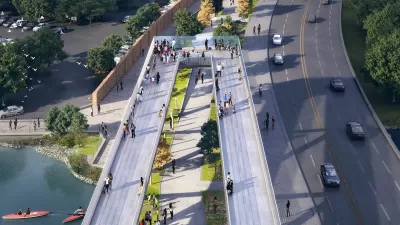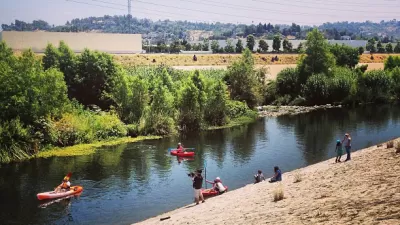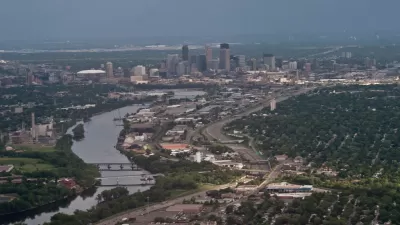Jon Christensen urges Los Angeles to ensure that new park amenities serve, rather than displace, the river's low-income communities.

As Los Angeles solicits public input on a park considered a key piece of the L.A. River revitalization, Jon Christensen ponders whether the city can achieve an "equitable and just greening." In a piece for CityLab, he offers more questions than answers about how to ensure the future of the low-income communities surrounding the river project.
While green spaces and parks yield important benefits to those with access to them, "improved parks, like other positive amenities—cool retail, coffee shops, fresh produce—are correlated with gentrification, in some cases," he writes.
That's a problem that Los Angeles will have to contend with as the promise of a naturalized river attracts real-estate investment that could threaten existing residents. Recently, the core community group Friends of the Los Angeles River (FOLAR)—whose decades of advocacy helped mainstream the revitalization effort—opposed a major housing development on the waterfront that didn’t include enough affordable units.
Last year, FOLAR published a guide to riverfront development focused on equity and affordability. Still, Christensen laments:
"Right now, we don’t have any really good models for inclusive green development that can lift up communities in place while providing the access to nature, open space, and recreational opportunities that we know are so important to the health of people and their neighborhoods."
FULL STORY: Can the L.A. River Avoid 'Green Gentrification'?

Planetizen Federal Action Tracker
A weekly monitor of how Trump’s orders and actions are impacting planners and planning in America.

San Francisco's School District Spent $105M To Build Affordable Housing for Teachers — And That's Just the Beginning
SFUSD joins a growing list of school districts using their land holdings to address housing affordability challenges faced by their own employees.

The Tiny, Adorable $7,000 Car Turning Japan Onto EVs
The single seat Mibot charges from a regular plug as quickly as an iPad, and is about half the price of an average EV.

Seattle's Plan for Adopting Driverless Cars
Equity, safety, accessibility and affordability are front of mind as the city prepares for robotaxis and other autonomous vehicles.

As Trump Phases Out FEMA, Is It Time to Flee the Floodplains?
With less federal funding available for disaster relief efforts, the need to relocate at-risk communities is more urgent than ever.

With Protected Lanes, 460% More People Commute by Bike
For those needing more ammo, more data proving what we already knew is here.
Urban Design for Planners 1: Software Tools
This six-course series explores essential urban design concepts using open source software and equips planners with the tools they need to participate fully in the urban design process.
Planning for Universal Design
Learn the tools for implementing Universal Design in planning regulations.
Smith Gee Studio
City of Charlotte
City of Camden Redevelopment Agency
City of Astoria
Transportation Research & Education Center (TREC) at Portland State University
US High Speed Rail Association
City of Camden Redevelopment Agency
Municipality of Princeton (NJ)





























